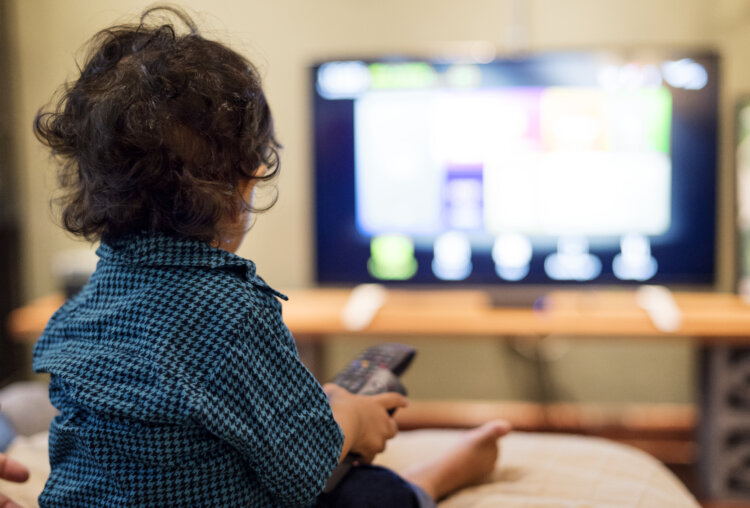
“P-p-p-paw-paw-paw patrol!” The refrain played on a loop in my brain as I tried to fall asleep last night—that’s how many times I heard the theme song from the popular kids’ show during my waking hours. My preschooler sang it during breakfast, on a walk, while he played with Lego, and somehow also as he brushed his teeth.
How did this happen? I’m a queer, feminist, screen-adverse, attachment parent with a deep suspicion of mainstream consumerism. How is my kid now obsessed with a hyper-marketed show about a white boy who owns six dogs—five of whom are also male—and regularly saves the day when the bumbling mayor (a woman of color) can’t?
The series might have some redeeming qualities, but I’m picking on this particular show because if I could go back through time and change the way I introduced television to my preschooler, I’d run the contending shows through a few tests—all of which Paw Patrol would have failed. Miserably.
Parents get a slew of advice on any given topic; trying to sort through it can be overwhelming. Mostly I muddle through, learn what I can, and fix mistakes as I go. Television, however, is one area I’ve been fighting to get back on track with for years. I’d love to have avoided screen time altogether. But it’s complicated; screen-based technology is becoming ubiquitous, and parenting is beyond tough sometimes. I had a newborn at home when I first pressed play on Netflix; between cluster-feeding, postpartum healing, and a highly spirited toddler to entertain, I was overwhelmed.
We’re a mostly screen-free family now, but it took a while to get back here. Here are three questions that would have made our screen journey more intentional.
What’s the plan?
The first, most obvious question is: “TV or not TV?” There is so much research out there, it can be helpful to go through some accessible round-ups from reputable sources such as NPR, Time and Forbes. If the answer turns out to be, in favor of some screen time, part B of this test must be “What’s our plan?” You might consider: How long do you want the kids to watch? On what days? In which situations? What kinds of shows do we want your kids exposed to? Where will you be while your kids are watching, and how will you connect with them during and after? Although some of our early screen time was haphazard, we muddled our way toward boundaries. We chose not to associate any one event or time of day with screen time. We’d typically only allow 25 minutes at a time. We never used TV as a bribe, a quick fix for big feelings, or a substitute for one-on-one connection.
How slow is this show?
A 2011 study by the American Association of Pediatrics advised that “Parents should be aware that fast-paced television shows could at least temporarily impair young children’s executive function.” Although this study was small and somewhat limited, I think about the shows I grew up on with even more fondness after reading it: Sesame Street, Reading Rainbow, and Mister Rogers’ Neighborhood. Starting with Paw Patrol for my son was like giving morphine for a papercut; it was overkill. Anything would have entertained him when he was so new to screens, but it’s hard to scale it back once you’ve dialed it up to the max. Although it can be hard to find these shows, your local library is a fantastic resource. Also, DVDs allow us to avoid the whining for “just one moooooooore” because unlike Netflix, DVDs have a definitive end.
Who is represented (and how)?
There is some compelling research demonstrating that when white boys watch mainstream television shows it can raise their self-esteem—on its own, this is hardly significant; however, the same study finds it decreases the self-esteem of black boys and all girls. But it doesn’t have to be this way. Writer and parent Thalia Kehoe Rowden has developed the Maisy Test for gender bias, sexism, and representation in children’s viewing—think the Bechdel test, but instead of a tongue-in-cheek way to expose sexism in the film industry, Rowden wants the Maisy Test to be an actual check-and-balance for our children’s media diet. The Maisy Test runs shows through four categories: gender representation, gender freedom, gender safety, and social justice and equity. This one does require parents to preview the shows our kids watch first. But there were many long days of parenting after which an episode of Peppa Pig would have been all my brain could handle anyway.
While I’m pretty happy with our family’s current relationship to screens, if I’d asked myself these questions to begin with, I may have found it easier to develop healthy habits—and ditched those six dogs while I had the chance.


Grok Nation Comment Policy
We welcome thoughtful, grokky comments—keep your negativity and spam to yourself. Please read our Comment Policy before commenting.